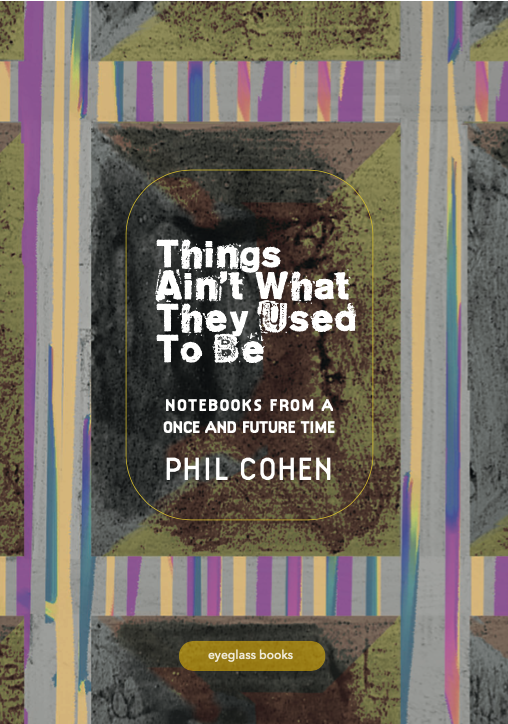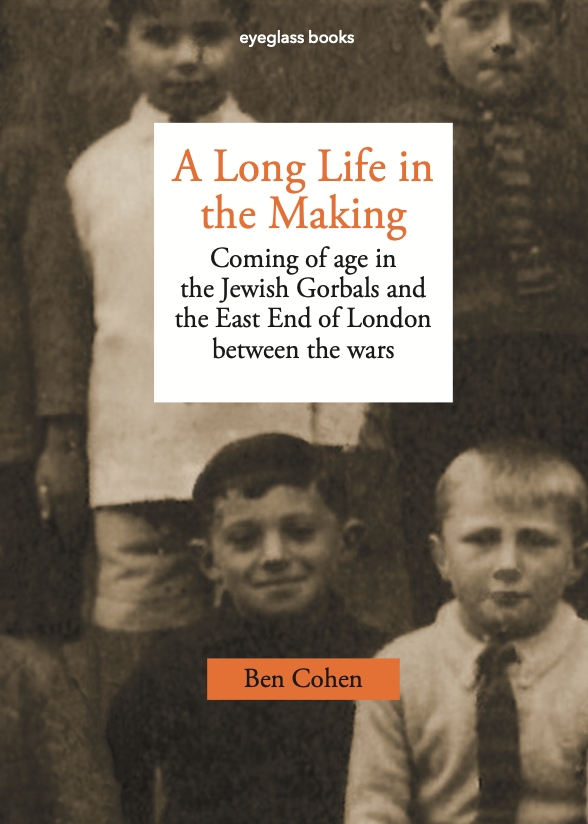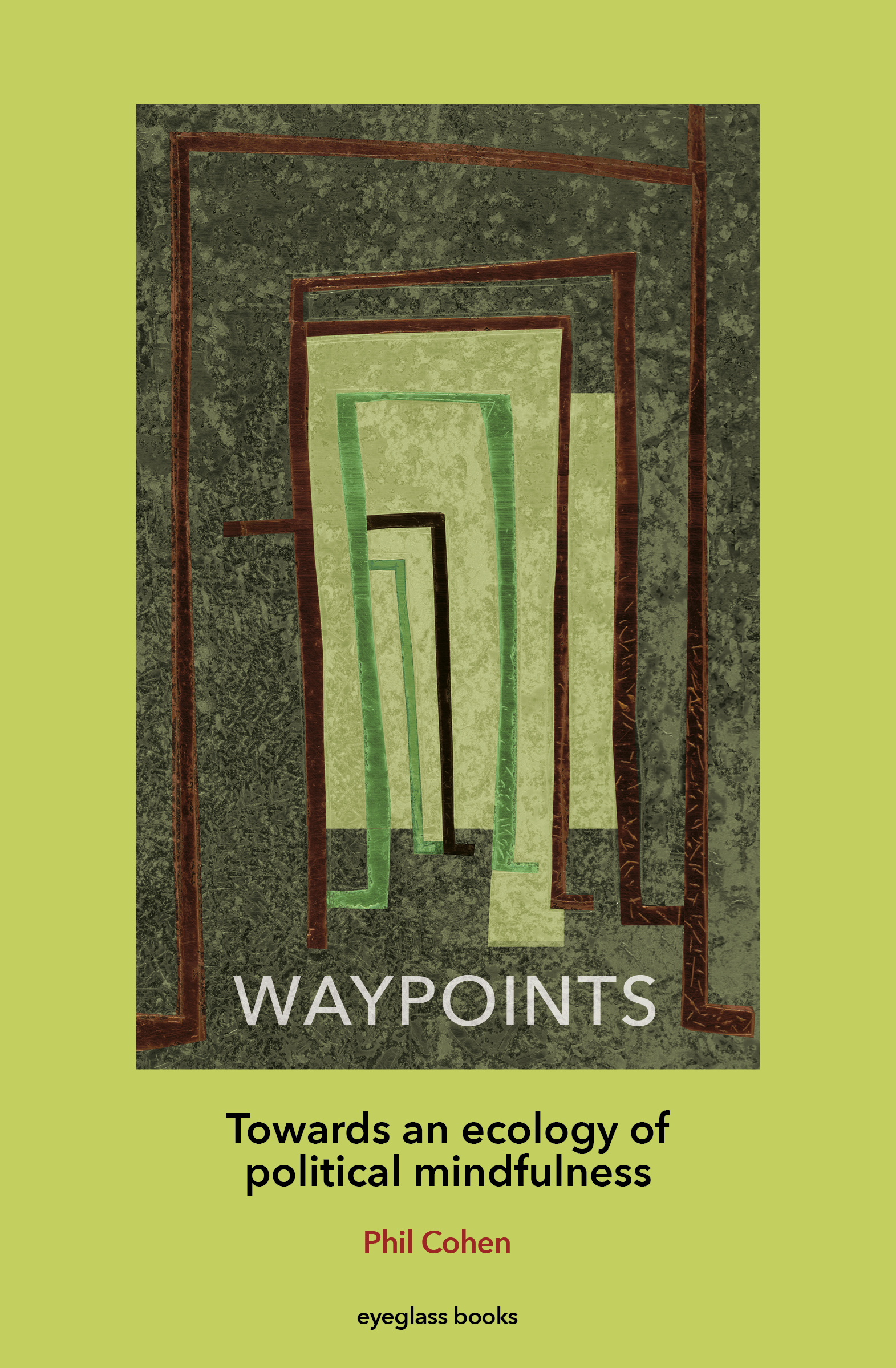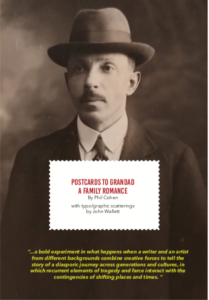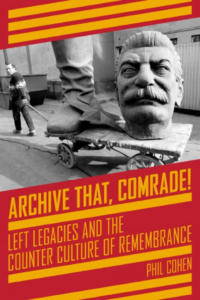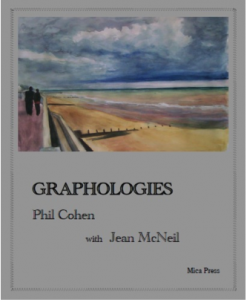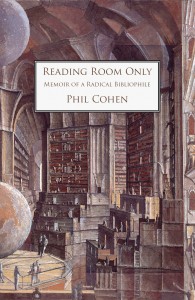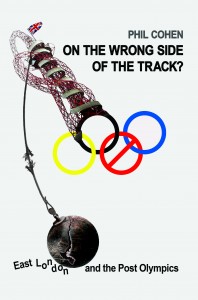This is the Preface to Waypoints Volume 2 : Studies in the Grey Zone , a collection of new work to be published by eyeglass books in September 2024
PREFACE: Writing behind the lines
The inferno of the living is not something that will be; if there is one, it is what is already here, the inferno where we live every day, that we form by being together. There are two ways to escape suffering it. The first is easy for many: accept the inferno and become such a part of it that you can no longer see it. The second is risky and demands constant vigilance and apprehension: seek and learn to recognize who and what, in the midst of the inferno, are not inferno, then make them endure, give them space.” Italo Calvino Invisible Cities
In the fictional dialogue between Marco Polo , the Venetian explorer, and Kubla Khan, the Tartar emperor, Calvino suggests an important implication between two different kinds of quest, the first embodied in imaginative curiosity about worlds other than our own, a wonder and delight in their otherness , and the second in the desire to own, control , colonise and exploit such environments for our own benefit. Today that double entendre is encapsulated in the term ‘speculation’ which includes works of fiction exploring alternative pasts, presents and futures and the dedication of ‘blue sky thinking’ to the promotion of venture capitalism and the search for ever more profitable investment opportunities . The Khan is fully aware of these dialectics of con/quest but Calvino leaves it to his traveller cum story teller to point out that it is precisely that drive to push against or leap beyond the existential limits of the human condition which is creating such an inferno , one which ,we might add , today embraces the whole planet.
To recognise and give breathing space (hence voice and agency) to that which is not inferno, is one of the primary tasks which writers of every kind, poets, novelists, historians, geographers and anthropologists have to undertake, often in and against the infernal entanglements of their various disciplines. If this book can make a small contribution to that project it will have served its purpose.
This volume brings together occasional pieces produced in intermittent moments of inspiration or, more likely, exasperation rather than explicitly forming part of a single developing line of thought. These writings are thus happily embedded in the time and place of their creation, but they are not wholly circumscribed by them. Although the choice of topics may seem somewhat arbitrary the book is not simply an anthology of contingent responses to passing events. However topical the issues addressed, my approach to them is shaped by a practice of considered and committed curiosity about the world that has remained relatively constant amidst the changing circumstances of my life, even as its focus has inevitably shifted, often in unpredictable ways, in consequence of a rapidly changing world .
In fact, this approach originated long before I knew how to give it a name and call it ‘auto-ethnography’. Like many children I found myself in a position of peripheral participation in my family discourse especially when I observed it in action during mealtimes. All my parent’s arguments took place over the dinner table and immediately prior to a row breaking out, my mother would scratch her head which was a cue for my father to do what he euphemistically described as ‘scratching my tail’. I became fascinated by this syncopated body language and made up all sorts of theories about it. I knew that scratching one’s head was a conventional sign of being perplexed, but scratching one’s arse, what could that possibly mean? Was it men’s way of showing puzzlement? Or was it something to do with being Jewish? It was only many years later that I discovered that my mother suffered from psoriasis which affected her scalp and my father had piles, both chronic conditions with a psycho-somatic component which are aggravated by stress. Even before that I had come to realise that behind the surface topicality of their arguments, which were mostly sparked off by political events of the day and their rival interpretations by a left wing socialist (dad) and a right wing proto-Thatcherite (mum), there lay a tangled web of repressed animosities and unfulfilled desires. It was this ‘other scene’ that gave their political arguments such a passionate and intransigent intensity; it is this more or less hidden emotional dimension whose roots I have subsequently sought to uncover in my research into sites of chronic social conflict, focussing on the political and personal impasses to which they give rise.
The texts collected here are all essays in that kind of situated enquiry and driven as much by existential as by epistemological concerns. Apprenticed at such an early age to the exercise of dogmatism on both Left and Right (note: I always took my father’s side in the political arguments) I have always been allergic to its ‘special affects’ and tried to avoid reaching foregone conclusions. In particular I have striven to distance my argumentation from the thumbs up/thumbs down judgementalism promoted by the twitterati, and the ‘if you are not with us, you are against us‘ knee jerk reactivism still current in the sectarian political cultures of both Left and Right.
My own research perspective is shaped by the fact that my intellectual formation occurred largely outside the university. My first mentor was Danilo Dolci, an architect turned agronomist and community organiser who formed co-operatives of peasant farmers in Sicily in a largely successful attempt to liberate their economy from the stranglehold then exercised by the Mafia. Inspired by his books, which combined ethnography with political analysis to tell a vivid story of class oppression and resistance, I used my gap year between school and university to join the brigade of volunteers at the international summer camp Dolci ran near Partinico. A larger than life figure with an infectious laugh, Danilo showed us that the struggle against injustice was a joyous experiment in human solidarity, socialism for him was a song and dance, a celebration of the struggle of life and love against the forces of death. He lived his beliefs, shrugging off the Mafia’s death threats and never for a moment allowing them to deflect him from his chosen path. Above all, he demonstrated that it was possible to be an intellectual and an activist, a poet and a political figure, to dig beneath the surface of things with both pen and spade.
It was his example which encouraged me to dropout out of my anthropology studies at Cambridge in the mid 1960’s, run away to sea and then become actively involved in the counter culture which was then emerging, meeting and working with artists and writers who were part of what became known as the London ‘underground scene’. This apprenticeship led to a period of community activism with the alternative squatting movement; then via a bout of anti-psychiatry to a series of radical educational projects involving young people who were being warehoused in dead- end training schemes. Their knowledge was strongly focussed around what was happening in their families, peer groups and neighbourhood, yet however locally situated, it resonated with issues of class and race, gender and generation which were structural and trans- local. Sadly none of this intelligence was educationally valued as a potential source of critical understanding about the world , indeed it was dismissed as part of a counter culture which threatened the authority of the school curriculum.
As a result of this experience it has never seemed enough to use ethnographic research for purely academic purposes, solely to document the ‘over determination’ or ‘multiple entanglements’ (to use a more current buzz word) of social or cultural phenomena in order to complicate their meaning. Even if every drive for clarity meets resistance and finds its counter point in the temptation to obfuscate or over simplify, that doesn’t mean that you give up trying to tease out its practical political implications!
Today there are widening areas of public discourse and private anxiety where received certainties anchored to inherited perceptions or fixed ideological and ethical positions no longer have so much traction in shaping commitments or actions, even though the inequalities and injustices which subtend them continue to multiply, intensify and intersect albeit in often new and unfamiliar forms. As violent repressive and authoritarian regimes grow in number so do practices of covert resistance which operate outside existing frames of political reference; meanwhile in what are formally supposed to be liberal democratic societies, new practices of illiberalism are taking shape and rendering ever more substantive patterns of discrimination and exclusion we had thought long since overcome.
Consequently, the main political focus of the book is on the collateral damage caused by the collapse of institutions and discourses which hitherto sustained principles of hope, if not certainty, in the advent of a better, more generous world, for the many, and not just the already privileged few. I have tried to stay as alert to new and surprising possibilities for democratic renewal as to the all too familiar structures which inhibit, pre-empt or corrupt their emergence. As the disunited island we ironically continue to call the ‘UK’ continues its struggle to find a coherent post-Imperial role for itself we need to challenge nostalgias for a brighter future based on unrealistic guarantees as vigorously as the longing to return to a better, more certain past that never was.
At the same time, as a committed Groucho Marxist, someone who would be reluctant to join a political club, or party, which would have me as a member, whilst remaining a conscientious fellow traveller in numerous radical Left wing causes, I have also to recognise that the movers and shakers who bring about change in society, whether for good or ill, tend to be people convinced about their own absolute clarity of vision and who abhor anything which complicates or muddles their perception of what needs to be done . Living as we do at a moment of great existential threat for both human and non-human life on our planet, there is no time for academic prevarication in the name of ‘pure critique’. Nor for the kibitzing or kvetching which remains an all too popular pastime on the marginalised Left. Equally we need to do more than reformat our existing fractured movements and ideologies- feminist, environmentalist and de-colonialist- into some notionally progressive alliance. Instead of a quest for a so called ‘definite’ Left, outside the labour movement and social democratic parties, I think it might be more productive to assemble some indefinite, or at least non- definitive articles of faith in what Living Labour and its reclamation of both the human and non-human worlds might achieve in creating a common platform for action[1].
The book thus represents a groping after some non-prescriptive points of political engagement in which it is still possible to remain in doubts and uncertainties and resist any irritable reaching after foregone conclusions disguised as ‘facts’. Just how far to carry the account in the direction of some kindof parti pris – with all the attendant risks of confirmation bias – is an issue I have tried to resolve in the light of what emerges from exploring some of the darker, more complicated aspects of the grey zone, instance by instance.
Not in my name? Welcome to the Grey Zone
One of its darkest instances irrupted as I was working on the final draft of this text .On October 7 2023 Hamas launched a murderous assault on Israeli settlements and a music festival across the border from Gaza , killing over 1400 civilians and taking 250 people, including children and elders, hostage. As readers will know the Israel Defence Force retaliated with mass aerial bombardments of Gaza before mounting a land offensive, designed to destroy Hamas as an organised force and resulting, at the time of writing, in over 35,000 civilian deaths, over a third of them children. Netanyahoo’s ultra-right wing Zionist government and Hamas’s radical Islamist movement form twin black stars in the political firmament, fatally attracted to sustaining each other’s death troll through the massacre of innocents. In an obscene rewriting of the Jewish Biblical foundation myth, the Palestinians are being driven into the Negev desert in flight from what has become the death camp of Gaza, while the collateral damage in terms of an exponential rise in anti-Semitic and Islamophobic attacks on their respective diasporic communities continues to unfold across the world.
The fact that Gaza is neither a sovereign independent state, nor in the strict sense an occupied territory means that its status in international law remains ambiguous which makes it difficult to convict Israel of committing genocide. Equally for anyone not directly implicated in this conflict, and even for some of them, it is not possible to side unequivocally with either of the warring parties. In any case, the exact balance of wrongs and rights remains a matter of bitter contention. All this means that in a terrible kind of way, the Israel/Palestine situation is grist to the mill of the argument which this book tries to develop about the grey zone. Nevertheless, as I discuss in Part One, the equivalence of public outrage at the atrocities committed by both sides masks a basic asymmetry in power between the Palestinian and Jewish communities. Yet it is one which does not yield any moral high ground and only fuels the conflict between rival Jewish and Palestinian victimologies, each weaponised as justification for the committal of further violence.
Like many of my friends I wanted to join the marches in support of an immediate cease fire and the beginning of a peace process that would lead to a just settlement. The situation recalled all too vividly the ‘million march’ against Britain’s involvement in the invasion of Iraq – an intervention which only fuelled the growth of militant Islamism, as exemplified by ISIS, the Muslim Brotherhood, Hezbollah and Hamas. So my first thought was to make a placard reading ‘Not in My Name’, the keynote slogan of that earlier march. Transposed to this new context it would refer both to the actions of Hamas (which some on the Left had either supported or glossed over) as well as to military retaliation by the Israeli government. But I had no sooner made that decision than it gave me pause for thought. Whose name exactly was I referring to?
My patronym is a strong, widely recognised, marker of Jewish identity, yet in my case it is really a kind of involuntary pseudonym. ‘Cohen’ was adopted by my paternal grandfather, when he arrived in Glasgow as a refugee from the Russian pogroms, shortly before the First World War. His given Russian name , Kvaktun, was virtually unpronounceable in Anglo- Scots without spitting and ‘Cohen’ was of course a high status moniker in the Jewish community. But was I really ever that name? Did I have any right to own it? As a mitschling, who was circumcised but spoke no Hebrew or Yiddish, at the age of 14 , instead of being Bar mitzvah’d I had been baptised and had the Bishop of London lay his hands on my somewhat bemused head to welcome me as a reluctant convert into the Christian communion. Shortly before that , my father had tried to persuade me to change my name to Witherspoon, because one of his wealthy and elderly goy patients by that name had no heirs, and wanted to leave me her entire estate on condition that that I changed my name to hers. To exchange one misnomer for another and inherit a fortune in the process, might seem like an attractive proposition. Moreover as part of his sales pitch dad suggested that due to antisemitism , as a ‘Cohen’ I would never be admitted to a golf club, a frustrated ambition of his that had not rubbed off on his son.. He was surprised and hurt when I adamantly refused to go along with the plan. The reason however, was not some sudden newly discovered pride in my latent Jew-ishness, but the simple fact that the prospect of having my new identity publicly announced before the whole school seemed like a fate worse than death.
According to Saul Kripke’s philosophy of language [2], the act of baptismal naming, even of the do -it – yourself variety, creates a material signifier which enters into circulation within a specific culture and linguistic community in such a way that it retains its nominal value and meaning even when its human referent has changed or no longer exists. After all, our name lives on long after we are gone in official records as well as in the memory of those we knew and loved, or hated. There was no sense in which I could be said to actively belong to a Jewish culture and community, however diasporic. Carrying on carrying the burden of mis/recognition associated with my inherited name did not in fact provide me with an alternative cover story, as a genuine pseudonym does. Quite the opposite. It implicated me in a version of Jew-ishness which I could only adopt in bad faith whilst remaining a reluctant beneficiary of its possibly unwanted legacy . An early lesson then in that involuntary duplicity which is the lot of anyone whose actual life history does not coincide with its primary inscription. .
Lesson one, aged 18, was getting beaten up in an East London police station by two cops, one of whom held me down and called me a filthy Yid, while the other kicked and punched me. Fortunately I had the presence of mind to scream as if they were hurting me badly, which they actually weren’t as presumably they were skilled in the technique of beating people up without leaving tell tale bruises. At any rate this reaction seemed to satisfy them and they stopped before they broke my ribs and had to concoct a story about me falling down stairs. A lesson then in the trickster arts , and how to use techniques of dissimulation, to pander to an oppressor’s will to power, while minimising its impact.
Lesson two took place thirty years later at Tel Aviv airport . I was flying home to Britain after attending a conference organised by Israeli educationalists to worry about young people no longer reading books in the age of the internet Judaism, of course, defines itself as a religion of The Book, but then so is Islam , and it had seemed curious to me that there were no Palestinian educationalists present . When I enquired the reason, the organisers explained that as Palestinian schools couldn’t afford books, they didn’t have this problem. So that’s all right then. This experience came back to me as I was standing in line at the airport on the way back to the UK , waiting to be checked out by the Israeli border police , a lengthy process often involving close interrogation of travel plans. An official came along checking we had our documents in order , He looked at my passport, frowned, and said ‘ come with me Professor Cohen’ . I had a sinking feeling that this was to be my Palestinian moment . I had heard stories of the bad treatment meted out at border crossings to people suspected of being hostile to Israeli policies in Gaza and the West Bank . Perhaps my critical comments at the conference had been relayed to the authorities? As it turned out I need not have worried. Thanks to ’Cohen’ on my passport I was taken to the front of the queue , and fast tracked through all the formalities , while my namesake ( as it turned out) enquired after my family’s health, and whether I had enjoyed my visit to the promised land. ‘Be sure to tell everyone what a great country Israel is and how well we treat all our citizens, especially the Cohen’s’ he said with a wink , as he waved me through customs .
Staring at my protest placard whose blankness had created the space to be filled with such ruminations I realised what an impossible task it was to translate any of them into a meaningful slogan. Certainly not that one. In whose name exactly would I be protesting? My grandfather’s, a lifelong socialist and internationalist, hostile to the whole Zionist project? Well certainly, but would he have approved of such a single issue campaign and its inflection of identity politics? Probably not! My father’s? Dad, was a confirmed atheist and socialist but read the Jewish Chronicle religiously every week, holidayed in Tel Aviv every Summer in his retirement and in old age wanted to be called Ben Zion , yet sympathised with the Palestinian predicament if not their political demands. Hmm. Then a thought struck me : perhaps I should go on the march in the name of all those whose names impose identities which do not fit them and who inhabit situations where lived contradictions, and the ambiguities which flow from them, make liars of fixed ascriptions and binary moral codes . It seemed unlikely that many of those marching would support such a slippery perspective. Nevertheless perhaps what needed to be highlighted was the struggle to make enough sense of the world’s complications to take a provisional stance on the issues, without falling back on fixed, readymade, answers that could be encapsulated in a slogan. I had stumbled on the missing link connecting all the disparate pieces in the book, providing a myth of its origins which might perhaps give it some retrospective coherence.
In the event, the march itself, the biggest in London since the anti-Iraq war demo, proved to be a case in point. The young Muslims, who formed by far the largest contingent and had travelled from all over the country to be there, were proudly wearing the Palestinian Keffiyeh, including the girls, as they chanted ‘In their millions and their billions, we are all Palestinians ‘ and ‘From the river to the sea, Palestinians will be free’. I asked one group, who had come from Bradford, what the slogans meant for them. The first one they were clear about. ‘We know what it’s like to be treated like second class citizens. We suffer racism too, Islamophobia is everywhere.’ The second slogan they were a bit vaguer about. ‘It’s about where the Palestinians live. It’s their land, isn’t it? Israel have stolen and occupied it. They claim it belongs to Jews, but it’s the Palestinians’ They were unanimous in condemning ‘Zionism’ though, not surprisingly, they did not seem to know much about its history as an ideology and social movement, or its role in the foundation of the Israeli state. They were adamant that the slogan could not be considered anti-Semitic. In fact ‘From the river to the sea’ was originally a Zionist slogan appropriated by Hamas and its meaning is ambiguous and contested: either a justification for exterminating the Jewish or Palestinian presence or an appeal for peaceful co-existence. In other words, it belongs in a grey zone and as such does not work well as a slogan from either perspective. A steward from the Palestine Solidarity Campaign, the key march organiser, had been hovering on the edge of the discussion. Now he intervened: This is not a constructive conversation: we should be concentrating on what unites us’, he said, before he took up his megaphone and started bellowing what he undoubtedly took to be a Hamas slogan. So that’s alright then.
This incident involuntarily brought to mind the famous Yeats quote ‘ the best lack all conviction while the worst are full of passionate intensity’ . The fact that there is so much righteous indignation being stirred up by the warring parties on both sides of the conflict has meant silencing forms of dissent that might ultimately lead to some kind of resolution. For example the vociferousness of the response to the Hamas attack has made it difficult for members of the Jewish diasporic community who are not Zionists and certainly do not support the Israeli’s state’s policies towards the Palestinians, to come out in favour of a ceasefire, because that might mean being ostracised by their own religious community at a time when they most need its support as they come under renewed antisemitic attack. So they look away from what is happening in Gaza and keep shtum. Under such circumstances it is all the more important to remain alert to what is not being said, those whose voices are not being heard amidst the infernal noise and clamour of political debate and to try to find ways of making a properly dialogic space in which these cries for help and hope can be properly registered and allowed to breathe.
Between a river and the sea
As it happens this book was put together in a place which is located between a river, the Colne, and the North Sea but which, of course, belongs to a very different political and cultural geography, Yet the Essex coast is an area also characterised by great extremes. It is where coastal erosion is proceeding at its fastest pace, a map extrapolating from current climate trends shows much of East Anglia under water by 2040. Its coastal towns like Clacton, Yarmouth, and Lowestoft, may promote themselves as glitzy seaside resorts, but they contain some of the most deprived communities in the UK. It is where much of the Cockney Diaspora from East London has settled, and for all too many ’white flighters’ it has proved the end of the line. Not surprisingly Brexit found some of its strongest supporters here. Yet it is also the birthplace of ‘Estuary English’ that strange demotic merging of different class dialects and the area has remained open to a myriad of cultural influences brought by travellers from both near and distant shores. It is where some have come to feel exiled and others to find refuge from the storms of history. Syrians and Afghans in Raynham Marshes, Hasidim in Canvey Island. Ukrainians , Palestinians and Hong Kong Chinese in Colchester. It has a history of left wing radicalism as well as right wing populism,
In a section of the book, entitled ‘From the Other Side of the Tracks’, I deal directly with the changes that have taken place in the East End of London and its Essex hinterland. This draws on my involvement in a series of ethnographic and educational projects with diverse communities over the past half century as they struggle to make sense of the demographic and economic transformations which have disrupted their life stories, their life styles and their livelihoods. Yet in a more general sense the experience of living and working in an area so strongly marked by negative public stereotypes but possessing such a rich, complicated, and contradictory multiculture, has been the best possible education for understanding the present political conjuncture; it has been especially good practice for learning how to read between the ideological lines which turn rivers and seas into border zones between rival visions of the body politic.
So let’s listen to Mahmood Darwish, the great Palestinian poet, who knew better than most about living and writing behind and between the lines of an occupied country and how, from that position, to turn exile into a homing device, reading principles of fluidity and hope into even the most seemingly fixed and barren terrain of oppression :
Water binds me to your name /There’s nothing left of me but you, and nothing left of you/but me, …. what will we do with what is left to us/of calm … and of a snooze between two myths?/And nothing carries us: not the road and not the house.//And what will we do?/What will we do without exile?
The Other Scene
Dreams are an integral part of the fieldwork required for any exercise in auto-ethnography, the other scene of writing what is always in some sense an allo-biography , an exploration of the stranger we have become to ourselves. My personal stake in putting this book together was suggested to me by a dream I had as the text was nearing completion. I will leave readers to make their own interpretations. It may be worth noting however that shortly before I had the dream I was inspired by reading a text by another great Palestinian writer, Edward Said. It was based on a lecture he gave to the Freud Museum in London in 2003 after he had been no platformed in Vienna. The lecture explores the relationship of the founder of psychoanalysis to Jewish culture and its Other (, i.e. non-European) Scene. The talk raises some fundamental questions about the limits and conditions under which psychoanalysis could develop to go beyond its initial Eurocentric – and Jewish – provenance. It was Said’s last text, published shortly before his death, and he had this to say about the nature of late works, not only Freud’s, but implicitly his own :
‘The intellectual trajectory conveyed by the late work is intransigence and a sort of irascible transgressiveness, as if the author was expected to settle down into a harmonious composure, as befits a person at the end of life, but preferred instead to be difficult, and to bristle with all sorts of new ideas and provocations’.
Here is the dream, which is perhaps also a kind of provocation , a version of end days in which there is not just a closure around an infernal past , but an opening into something other and better than their future re-iteration :
I am visiting a strange kind of theme park. At the entrance there is a gateway which reminds me of Auschwitz with a sign above reading WELCOME TO THE GREY ZONE. Inside, instead of rides, there are cages with people dressed as clowns and animals working on ‘Heath Robinson’ looking machines. The machines produce excrement in little heaps. Each heap is very smelly and crawling with larvae which turn into grey butterflies. The child visitors chase them with nets and when they catch one they hand it in at a kiosk which issues them with liquorice sticks in exchange. Everywhere you look there are kids running around with liquorice smeared all over their faces. The liquorice has a powerful scent which masks the smell of the poo. The words ‘Perfumed Putrefaction’ come to mind. Then I pass by a carnival parade with characters from the mediaeval ‘monstrous races’: there is one with two heads, another with a head on his chest, yet a third with a dog face. The parade is being policed by guards dressed in grey pyjamas, reminding me of the inmates of the camps. From time to time they perform cartwheels while the watching crowd applaud enthusiastically and give the Sig Heil salute. I turn my back on the scene and walk towards a tower made out of books. The books face outwards so you can turn the pages and read them. I start reading a book which has Primo Levi’s name printed on the inside title page but Edward Said’s signature is on the fly leaf, as if the book has been purchased at an author’s signing. Before I can delve into the book a fierce wind gets up and blows the pages all over the place. I run after them and try to gather them up but it starts to pour with rain and I am left with just a few soggy pages in my hands, standing amidst rising waters. Yet I feel excited at having salvaged something from the flood and by the possibility that these blurry words will help make sense of what has occurred and maybe prevent it happening again.
Maybe some of the ones in this book ?
[1] See https://www.bylinesupplement.com/p/the-year-of-the-definite-left-
[2] See Saul Kripke Naming and Necessity Harvard University Press 1980
